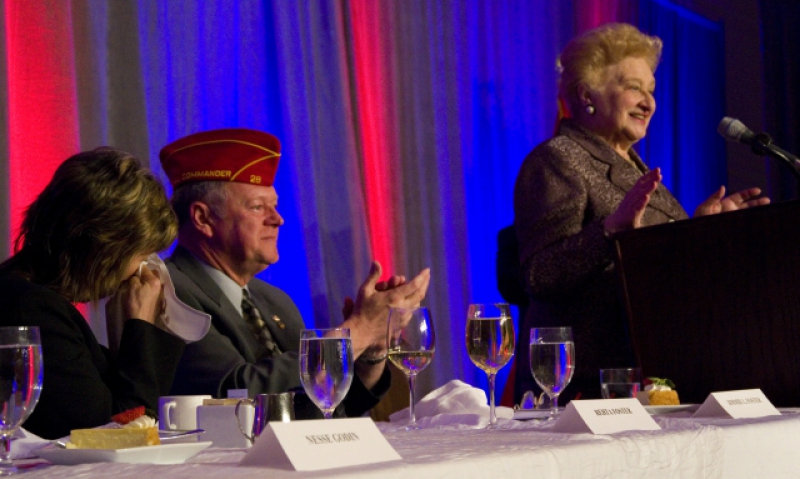
A Holocaust survivor and the winner of the National Commander's PR Award, Nesse Godin honors her pledge to tell the story of one of humanity's darkest times.
Already living in the Shauliai, Lithuania, Ghetto at the time, Nesse Godin was shipped off to the Stutthof concentration camp by the Nazis at age 16. She survived four labor camps and a death march before World War II ended. While her father died during the Holocaust, Nesse was able to move to the United States with her mother and brother and start a life that now includes educating people on the lessons of the Holocaust and the need to remain vigilant to ensure that it doesn’t happen again.
A founding member of several Holocaust survivor groups and a volunteer at the United States Holocaust Memorial Museum, Godin was presented the National Commander’s Public Relations Award for 2011 during The American Legion’s 51st Washington Conference. Godin joined a distinguished list of past winners that include media pioneers, entertainers and advocates. For the complete list, click here.
Godin took time to talk to The American Legion before receiving the award.
The American Legion: You speak very passionately to groups about avoiding the same mistakes that were made during the Holocaust. Even after so long, where do you get that passion?
Nesse Godin: I’m a survivor of the Holocaust who lived through the worst time in humanity. I’ve witnessed the worst things you can imagine from the age of 13 to 17. How did I survive, a little girl, through those terrible times? With the help of the Lord in Heaven, by whatever name we called him. He looked over me, a little girl. But most of all, Jewish women that felt sorry for a little girl that was alone, separated from the family. When I cried of hunger, they gave me a piece of bread. When I shivered of cold, they wrapped my body in straw. When I lay on the ground when I was beaten up, I wanted to die. I said, “Dear Lord, take me. I cannot take it anymore.” The women said, “You have to survive. Don’t give Hitler a victory. But if you survive, don’t let us be forgotten. Light a candle for us, but most of all, teach the world what happened here.” And I promised them. The Russian soldier that came in and liberated us wherever we were, I started to tell him what happened. And through the years, I’ve been speaking to so many schools and organizations – even before the Holocaust museum was built. My talk is not always the same talk, but my message is always the same. If I go into a school, I teach those kids not to join a gang. I teach them not to be bullies, (but) to be kind to each other and to share a bite of bread. I always tell them, ‘In case somebody said they forgot their lunch, do you break your lunch in half and give them?” The letters come about what a difference I made in their life.
TAL: You’ve been speaking to Boys Nation delegates for about a decade. What is it about that particular audience that brings you back year after year?
NG: I tell you why I look forward to it: Not because I do the presentation, but because I get feedback from the senators. They call me. They ask me to come to their states to speak. They write to me and say, “You changed my life. You taught me to speak up when I see a wrong. You taught me to help other human beings.” You see, I just don’t talk about how people were killed. You cannot bring them back. But we can make a difference now.
TAL: You are a personal friend of Gen. David Petraeus, and you carry a picture of the two of you together. You speak to U.S. servicemembers and the service academies. Do you feel a connection with the U.S. military because of their role in defeating Germany during World War II?
NG: I do. My brother was liberated by the 101st Airborne Division. When I (talk) to the military, I always talk about the difference between the military then – the German military – and our military. They were there to kill, and ours is there to save. Look all over the world today – we are saving people.
TAL: What does it mean to you to receive the Legion’s National Commander’s Public Relations Award?
NG: I didn’t even know how big that thing is. I didn’t know until I got the letter telling who (previous recipients were). I told them, ‘I’m not even in their category. Who am I?’ But people must think that maybe I deserve it.”
- Washington Conference

